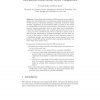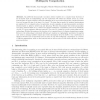31 search results - page 1 / 7 » On the Hardness of Information-Theoretic Multiparty Computat... |
EUROCRYPT
2004
Springer
13 years 11 months ago
2004
Springer
We revisit the following open problem in information-theoretic cryptography: Does the communication complexity of unconditionally secure computation depend on the computational com...
SACRYPT
2009
Springer
14 years 9 days ago
2009
Springer
We re-visit the problem of secure multiparty set intersection in information theoretic settings. In [16], Li et.al have proposed a protocol for multiparty set intersection problem...
CRYPTO
2000
Springer
13 years 10 months ago
2000
Springer
Secure Function Evaluation (SFE) protocols are very hard to design, and reducibility has been recognized as a highly desirable property of SFE protocols. Informally speaking, reduc...
GRC
2008
IEEE
13 years 6 months ago
2008
IEEE
—Secure multiparty computation is a very important research topic in cryptography. A secure multi-party computation involves N untrusful parties. It takes input xi from the ith p...
EUROCRYPT
2011
Springer
12 years 9 months ago
2011
Springer
An additively-homomorphic encryption scheme enables us to compute linear functions of an encrypted input by manipulating only the ciphertexts. We define the relaxed notion of a se...


